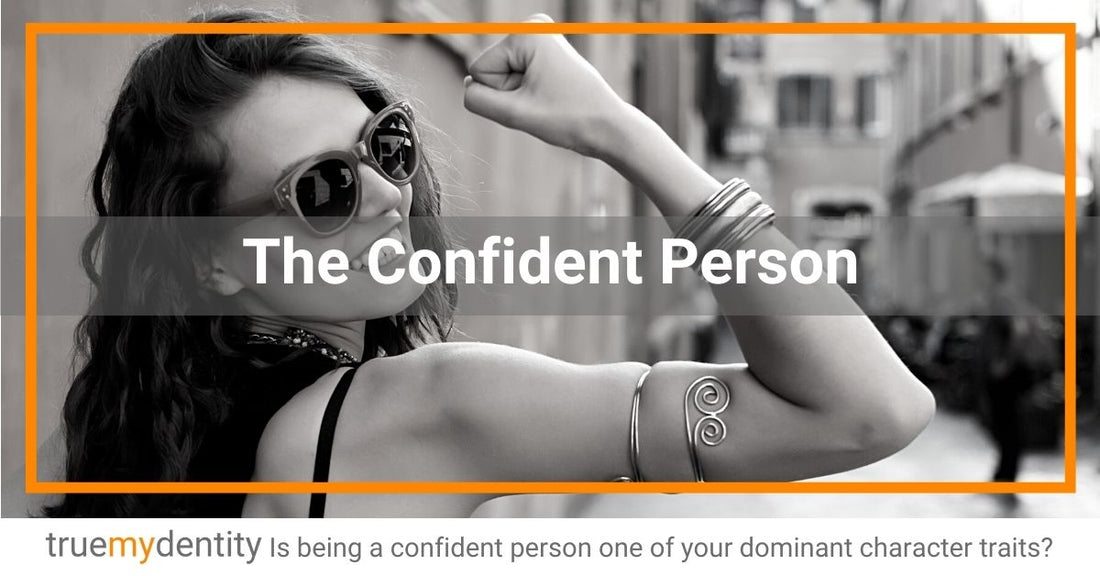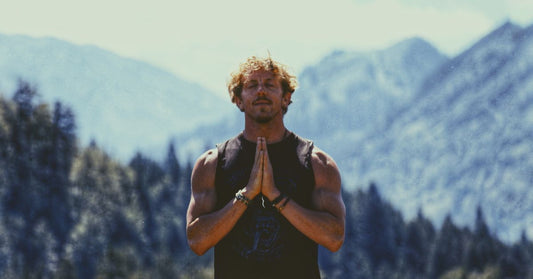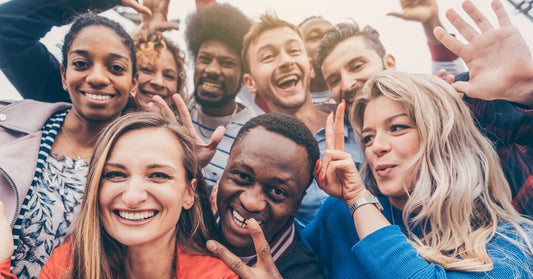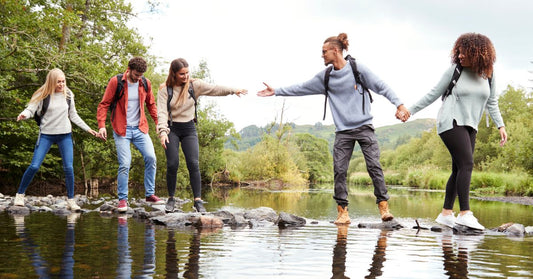
The Confident Person | 10 Tips on How to be More Confident
Luke FeldbruggeShare
A confident person believes in who they are, the skills and talents they possess, and their ability to do something well. When tested or challenged, the confident person trusts they will persevere and overcome the obstacles. Everyone has a level of confidence as they go through life. Some people are more confident than others. Here we take a deeper look at confident people, and why confidence is so important. If you are looking for ways to improve your self confidence we offer some tips on how to be more confident in yourself.
What it Means to be a Confident Person
Confident Definition
Merriam-Webster's CONFIDENT definition (adjective): a feeling or consciousness of one's powers; having a feeling or belief that you can do something well.
True Mydentity prefers to add a little spice to that dish.
A confident person believes they can do it even when people say they can’t. The confident person doesn’t need validation from others to help them feel capable of accomplishing something. Oftentimes, confident people will try something solely because other people have told them they can’t do it. Confident people volunteer to do something because they believe they can do it well, or they’re up for a challenge. They will take on challenges that push their limits and skills for two primary reasons:
- They want to see if they can actually do it
- They want to show someone else they can actually do it
By trying new things and succeeding at a level one finds acceptable, one's confidence increases. The confident person understands by pushing themselves to overcome new challenges, they learn new skills through their experience, and become more capable of overcoming future challenges.
A confident person is willing to put themselves in situations where they are likely to be challenged because they know their abilities provide them with a firm foundation for success.
Complete our free questionnaire and find out if being confident is one of your most dominant character traits, and which of the other 58 traits are also your most powerful qualities.
Building My Self-Confidence
I was blessed to be raised by loving parents who offered support and encouragement. Yes, there were those moments when I had to pay the price for “not listening” or “breaking the rules” but for the most part I was raised in a loving, nurturing household. It helped me become more self confident. I didn’t begin to question myself until other children made me feel shame or doubt.
Other people played a big role in my self confidence. Some would bring me down while others lifted me up. They continue to do this today, but they have far less impact on how I feel about myself now. Over time as I became more aware of my skills, abilities and talents; it was easier for me to reclaim control of how I felt about myself. I found how to be more confident in myself as I better understood myself.
It took time to learn. I’m still learning my capabilities and limitations and how to be okay with all of it. I’m not afraid to fail, but I really dislike it when I do. I’m most satisfied when I do things well. However, I have learned to accept any outcome if I know I did my best, or I at least did the best I’m willing to try. If I do not feel this way after trying something, I try it again and again until I succeed, or I can comfortably say I tried my best. This is probably my biggest personal contribution to building my own self confidence.
When I do something I try my best.
I also needed to be given opportunities and the chance to succeed. My confidence grew exponentially because other people who I trusted, admired or who were in a position of power/influence gave me a chance. They put me in a position to earn a spot, advance a project, or help the team. When they did, I wanted to show them they made a good decision and also prove to myself I could do it.
When I’m given the opportunity I try my best.
Now as a middle-aged man I’m more aware of my abilities and I’m less concerned about peer acceptance, but those younger development years were crucial in preparing me for life’s challenges. By getting some wins early on, I was able to experience the rewards of hard work, perseverance, and accomplishing something challenging. Today, those wins help me to work through feelings of self-doubt.
I believe it is forever important to challenge yourself. Try new things and push yourself to do things you’re not entirely comfortable doing. And above all, try your best when given the opportunity because it was given to you for a reason.
Why is it Important to be Confident?
Willing to Step Up and Persevere
Remember that time when you were so proud of yourself for accomplishing, _______? You worked so hard. You faced so many challenges. There were people who encouraged you. And, others who said not to try or didn’t believe you could do it. But you did, and it felt amazing. The memory still feels good.
During the entire process you were building confidence. You took steps to achieve something and in the end, you accomplished what you set out to do. That win and others like it help to keep you going and overcome self doubt when you face challenges now. If you could get through it then and feel good about your achievements, then you can do it elsewhere in your life as well.
Being Confident Helps Deal with Failure
Being confident will not keep you from failing but it can keep you from beating yourself up over it. Look back to the moments when you were proud of accomplishing something. Along the way to that achievement, you likely made mistakes or something didn’t go as planned. But you kept going and overcame those setbacks.
Over time you realize setbacks are part of the process. It’s not possible to know everything so something is likely to get missed. Setbacks and failure present an opportunity to learn and grow. Working through those occurrences actually helps build your confidence.
Being Confident Leads to Less Anxiety
The voice of fear and doubt that says things like, “you’re not good enough”, “you can’t do it”, “it’s too hard for you,” can be a powerful influence on our decision making. These doubts and negative thoughts have been linked to anxiety and depression. When doubt and overthinking becomes overwhelming, they can cause someone to withdraw from everything. They can keep you from trying many things that would help you better understand yourself; including your potential.
Everyone is wrapped up in their own thoughts and worries. But, when you’re more confident you’re actually less focused on yourself. This allows you to be more engaged with other people and not caught up in your own thoughts. This can also lead to stronger empathy toward others and help build more meaningful relationships.
By building your confidence you focus less on worrying and self-doubt, and more on believing in yourself and giving yourself a chance to succeed. You worry less about how the outside world perceives you. In turn, more self-confidence gives you the ability to focus your energy on other people and other pursuits by getting you out of your own head.
Stronger Understanding of Who You Are
Being more confident typically means you’re more in touch with your authentic self. You likely have a pretty good understanding of your strengths and how to use them. And to some degree, you have recognized or accepted what causes you to struggle. The important takeaway is, by being more confident, these things do not change your self-worth.
You find more comfort with your place in the world. Your actions tend to align with your values and beliefs. You have learned through trial and error. You have experienced some victories and some failures. You will have acquired adequate skills and know-how to be present, listen, stand up, speak up and take action when appropriate. You’re more confident because you have a better understanding of who you are.
Characteristics of a Confident Person
BRAVE
The confident person can be brave when faced with a challenge. They are often willing to stand up and face off with something or someone in support of their values or beliefs.
DECISIVE
The confident person is not afraid to make a decision. They have a good understanding of their strengths and weaknesses. They have a good understanding of their values and beliefs. They are also willing to take action, to step up and help, even if they’re not fully comfortable in their assigned role or responsibilities. Therefore, when it comes time to make a decision, they will align themselves accordingly.
MOTIVATED
A confident person typically wants to take action. They know by getting involved, by trying new and different things, their skills and experience will grow. This makes them more valuable and better able to make an impact on things that align with their values and beliefs. Their purpose motivates them.
OPTIMISTIC
Because confident people have likely found success in accomplishing some of their goals or overcoming difficult challenges in the past, they are likely to be optimistic about being able to do it again. They are more likely to have a “can-do” attitude.
RESPONSIBLE
Confident people accept and dutifully attend to their responsibilities. Being confident gives them the ability to accept the outcomes of their actions and any repercussions resulting from the outcomes. Whether the results are positive or negative, they will not change the confident person’s perceived self-worth.
10 Tips on How to be More Confident
There is no doubt throughout one’s life there will be moments when it is important to understand how to be more confident. One must practice confidence to build confidence. You want to achieve a level of realistic confidence. Too much confidence can be as harmful as not enough confidence. Honestly, it takes work to build, develop and maintain self-confidence so here are 10 tips on how to be more confident:
- Accomplish things. Be productive. Try to complete whatever you start. It’s generally most gratifying to accomplish something from beginning to end.
- Try new things. This will help you better understand your abilities and how comfortable you are with them. It is likely you have skills and capabilities you rarely use or are completely unaware of.
- Listen to your fears. Sometimes it may get in the way, but fear is not your enemy. It warns you. Let it show you where you may need to practice or try again to improve your abilities until you feel more confident.
- Improve your posture (no joke)! Your physical posture can improve self-confidence, even if you’re not feeling confident. Spending two minutes a day on this hack could help you feel more powerful and less stressed. Harvard social psychologist, Amy Cuddy, conducted a study showing the positive effects of confident body postures (I highly recommend watching this video if you’ve not watched it before; or even if you have, it's a good reminder).
- Exercise regularly. 20 minutes a day (or 150 minutes a week) of brisk walking, riding a bike, dancing or rollerblading will work to get the blood pumping. Just remember to switch it up occasionally to avoid getting bored. If you do more, great! The point is to get the body moving. It’s good for brain and body function. When your mind and body are working well, you’re likely to feel more confident.
- Visualize succeeding. Imagine yourself successfully doing what you want. See it in your mind first. Imagine how you want it all to go down, then work toward making it happen. Just remember it does need to be perfect, so don’t overthink things. It’s good to visualize to get your head in the right place, but none of that will matter until you actually do something or accomplish something.
- Set challenging, but attainable goals. Achieving your goals is foundational to building confidence. Accomplishment or getting things done feeds your happiness, improves your well-being, and boosts your self-confidence.
- Help others. When someone needs a hand, needs support, or offers you an opportunity to contribute toward achieving something; help that person. It feels good to help someone. It gives us a greater sense of fulfillment and provides meaningful purpose to our lives. And when you feel good about what you’ve done, confidence gets a boost! This is my personal favorite tip on how to be more confident because it serves the greater good.
- Practice, practice, practice these tips on how to be more confident. You must practice confidence to build confidence, just like someone practices playing the guitar to play the guitar better.
- Be patient with yourself. Building confidence is a process. It involves learning about yourself and that takes time. Minimize negative self-talk. Recognize moments when you feel self-doubt and try to determine what’s really causing it so you can address it. Give yourself permission to learn, take risks, and make mistakes. Be kind and encourage yourself as you learn.
Confident - True Mydentity Style
True Mydentity offers designs on our clothes that highlight 58 positive human character traits. The powerful confident trait is one of the 58 character traits featured. We believe if you know your dominant positive characteristics, and focus on what you do to learn, work and build relationships using these dominant traits, you will feel more fulfilled and closer to your purpose. And as you improve upon leveraging these positive character traits in your learning, work and relationships; you move toward discovering your full potential.
Reinforce the power of your most dominant character traits. If you are a confident person, proclaim it with True Mydentity clothes; comfortably casual for the authentic and empowered.
VIEW CONFIDENT CLOTHING COLLECTION >>
Complete the questionnaire and find out which of the 58 traits are your most dominant.



